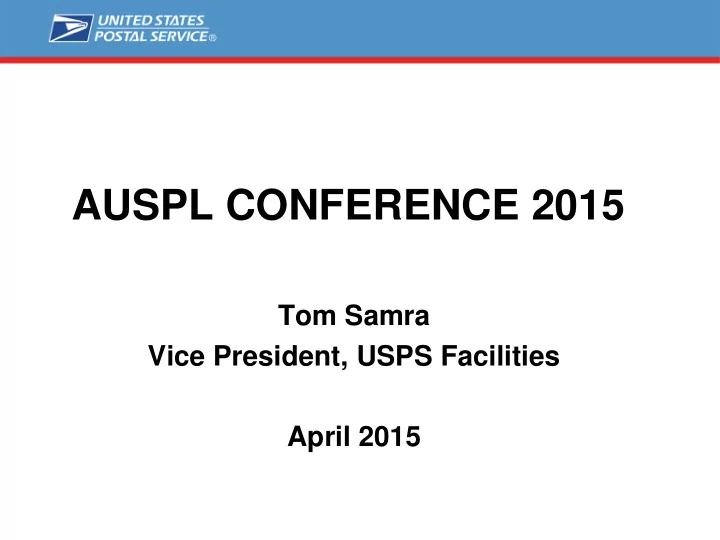

AUSPL CONFERENCE 2015 Tom Samra Vice President, USPS Facilities April 2015
AGENDA USPS – STATE OF THE UNION USPS – FACILITIES REORGANIZATION Leasing New - Conflict of Interest Forms Maintenance (EMCOR) Purchase Existing Building (PEB) considerations REAL ESTATE TAX ABATEMENT PROGRAM AUSPL/USPS COOPERATIVE OPPORTUNITIES QUESTIONS AND ANSWERS 2
STATE of the UNION USPS STATE of the UNION 3
HELPING BUSINESSES CONNECT & GROW CONNECTING & INFORMING CONVENIENT, AFFORDABLE CITIZENS & COMMUNITIES UNIVERSAL SERVICE PROMPT, TRUSTED, SECURE, RELIABLE SERVICES RESPECTED BRAND USPS MISSION:
The Unrivaled Network 5
USPS Global Footprint 31,000 300+ 8,500 POST PROCESSING PROCESSING OFFICES CENTERS EQUIPMENT 210,000 600,000 153M VEHICLES EMPLOYEES DELIVERY POINTS Delivering 40% of the World’s Mail
Business Platforms First Mile Physical Network Last Mile Digital Retail Mail Processing Carrier delivery Secure digital Centers communication Collection boxes Home and Carrier pick-up Post Offices Identity business customer authentication usps.com Transportation interaction Sales assets Post Offices Business mail acceptance Self-serve 7
Challenges Volume Universal Service Declining Fixed cost Transactional volume steadily base Obligation declining due to e-diversion Advertising mail is subject Postal network driven by: to more substitution options Delivery points Mail volume highly sensitive Retail locations These trends will to economic changes Sortation facilities Mail mix changes – Six-day delivery continue to put lost profit contributions pressure on USPS ability to provide Price Labor Costs affordable universal ~80% of total costs Limited pricing flexibility service COLA increases Benefits: pensions, retiree health, health insurance Limited flexibility Rising cost Retiree prefunding Rising but per hour obligation, rising workers’ capped compensation costs 8
Projected Mail Volume By Major Classes of Mail 90 80 Std. Mail grows 2% 70 Volume (billions) 60 50 FCM declines 22% 40 30 20 Packages grow 49% 10 0 FY2013 FY2014 FY2015 FY2016 FY2017 FY2018 FY2019 FY2020 First Class Standard Packages 9
Continuous Efficiency $16 Billion of Annualized Savings in the past eight fiscal years with workhours reduced by 24% 1,500 $18.0 1,459 $16.1 $15.6 $16.0 $14.9 1,423 $13.9 1,400 $14.0 $12.8 1,373 Total Work Hours $11.4 $12.0 ($ billions) 1,300 Savings (millions) 1,258 $10.0 Cumulative Savings $8.3 $8.0 1,183 1,200 1,149 $6.0 1,122 1,110 1,107 1,102 $4.0 $3.5 1,100 $1.5 $2.0 1,000 $0.0 2006 2007 2008 2009 2010 2011 2012 2013 2014 2015 IFP Total Work Hours
Business Imperative Financial losses of $26 Billion over last 3 years Continued decline of First-Class Mail volume Increasing wage inflation and operating costs Debt pressures Uncertainty regarding legislative reform Review of postal prices in courts Needed capital investments to acquire package sorting equipment and replace aging delivery vehicle fleet 11
USPS Business Plan Closing the Gap Legislative Initiatives Operational Initiatives Transforming Infrastructure Continuous Improvement Workforce Increased Flexibility
Closing the Gap Infrastructure Network 350 Processing Facilities Eliminated 320 Processing Facilities Remain Retail POST Pan – 50% of Post Offices Moved to Part-Time Consolidated 2,413 Delivery Units Delivery Streamline Governance Model Eliminated 24,000 Delivery Routes since 2006 60% of New Delivery is Centralized 13
TECHNOLOGY “Leveraging INNOVATION and to drive CUSTOMER AND BUSINESS VALUE” 14
Visibility Provides Business Intelligence
Visibility Provides Business Intelligence Apply an intelligent and trackable barcode to every mail product STRATEGY IMb for letters and flats IMPb for packages IMtb for trays and sacks IMcb for pallets and containers
Visibility Provides Business Intelligence Scan all mail products for all events across the USPS network STRATEGY Expand the number of events provided Ensure all postal sites have scanning capability for all events Move to real-time delivery information
Our Customers Expectations Consumers’ busy lifestyles demand more delivery convenience These changes Growing set new consumer expectations Consumer Expectations New businesses take notice of these demands and offer more expedient deliveries Existing players improve their offerings to meet demand 18
QUESTIONS QUESTIONS 19
Recommend
More recommend